Search
for
Sort by
Research
570-600 / 1000+ resultsresearch A Rare Case of Woolly Hair with Unusual Associations
The document reports a unique case of woolly hair with a combination of conditions not previously seen together.
research A Quantitative Technique to Analyze and Evaluate Microstructures of Skin Hair Follicles Based on Mueller Matrix Polarimetry
The technique accurately identifies and evaluates hair follicle structures in skin.
research Drug Utilization Pattern and Adverse Drug Reactions of Chemotherapy in Pediatric Patients at Muhimbili National Hospital, Tanzania
Most pediatric cancer patients at Muhimbili National Hospital in Tanzania experienced side effects from chemotherapy, with nausea, hair loss, and low white blood cell count being the most common.
research Alopecia Areata: Autoimmune Nature, Genetic Associations, and Treatments
Alopecia areata is an autoimmune disease with genetic links, treatable with certain medications, and can affect mental health.
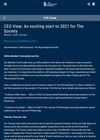
research CEO View: An Exciting Start to 2021 for The Society
The Society had a promising start to 2021 with a new online platform, grants program, and elected Trustees.

research Health Hazard Evaluation Report: HETA-2000-0385-2813, Equifax Payment Services, St. Petersburg, Florida
The investigation found no work-related causes for employee hair loss at Equifax Payment Services, and the environment was not hazardous.

research Menstrual Irregularity in Women with Acromegaly
Women with acromegaly often have irregular periods due to hormone imbalances and growth hormone effects.
research Alopecia Areata: What’s New in Epidemiology, Pathogenesis, Diagnosis, and Therapeutic Options?
New insights into the causes and treatments for the autoimmune hair loss condition Alopecia areata have been made.
research Commensal Microbiome Promotes Hair Follicle Regeneration by Inducing Keratinocyte HIF-1α Signaling and Glutamine Metabolism
The skin's microbiome helps hair regrow by boosting certain cell signals and metabolism.
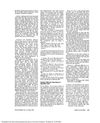
research Telogen Effluvium Secondary to Starvation Diet - Reply
Extreme weight loss from crash dieting can cause significant hair loss.

research Sulforaphane Mobilizes Cellular Defenses That Protect Skin Against Damage by UV Radiation
Sulforaphane from broccoli can help protect skin from sun damage.

research American Academy of Dermatology 44th Annual Meeting Highlights
Minoxidil showed a 30% success rate for hair growth in a study, and various skin treatments were effective, but some had limitations or side effects.

research Obstructive Sleep Apnea, Low Transferrin Saturation Levels, and Male-Pattern Baldness
Men with sleep apnea and low iron levels are more likely to have male-pattern baldness, especially if they have a family history of hair loss.
research Growing Up Fast: Managing Autism Spectrum Disorder and Precocious Puberty
The document discusses a young boy with autism and early puberty but does not provide a conclusion on managing his behavior.

research Addressing Autoimmune and Immune-Mediated Skin Disease Burden in Women
The conclusion is that women are heavily affected by autoimmune skin diseases, face significant challenges, and need better research, treatments, and healthcare policies.
research Retinoic Acid-Induced Epidermal Transdifferentiation in Skin
Retinoic acid helps change skin cells and is important for skin development and hair growth.

research Low Sex-Hormone Binding Globulin Levels in Young Women with Diffuse Hair Loss
Young women with diffuse hair loss may have low SHBG levels, which could lead to more active testosterone and contribute to their hair loss.
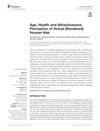
research Age, Health, and Attractiveness Perception of Virtual Human Hair
Hair style affects perceptions of age, health, and attractiveness more than hair color does.

research Gene-Wide Association Study Between the Aromatase Gene (CYP19A1) and Female Pattern Hair Loss
Aromatase gene variation may increase female hair loss risk.

research The E211 G>A Androgen Receptor Polymorphism Is Associated With a Decreased Risk of Metastatic Prostate Cancer and Androgenetic Alopecia
E211 G>A gene linked to lower risk of severe prostate cancer and hair loss.

research 5α-Reductase Type 2 Gene Variant Associations with Prostate Cancer Risk, Circulating Hormone Levels, and Androgenetic Alopecia
A49T gene variant linked to higher prostate cancer risk, lower hormone levels, and slightly reduced balding risk.

research Hair Matrix Cell Kinetics: A Selective Review
Hair growth is influenced by factors like genetics and nutrition, and more research is needed to understand hair loss and growth mechanisms.
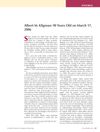
research Albert M. Kligman: 90 Years Old on March 17, 2006
Albert M. Kligman, who turned 90 on March 17, 2006, made significant contributions to dermatology, including creating treatments for acne and studying skin aging.

research The Long-Term Effect of Doxazosin, Finasteride, and Combination Therapy on the Clinical Progression of Benign Prostatic Hyperplasia
Combination therapy of doxazosin and finasteride safely and effectively reduces benign prostatic hyperplasia progression risk.

research Coats' Plus: A Progressive Familial Syndrome of Bilateral Coats' Disease, Characteristic Cerebral Calcification, Leukoencephalopathy, Slow Pre- and Post-Natal Linear Growth, and Defects of Bone Marrow and Integument
Coats' Plus is a genetic disorder with eye abnormalities, brain calcification, poor growth, bone and skin issues, and movement disorders.
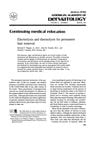
research Electrolysis and Thermolysis for Permanent Hair Removal
The document concludes that electrolysis and thermolysis can permanently remove hair but calls for better regulation to ensure safety, and notes a possibility of hair regrowth and rare complications.

research Genetic Defects in Human Pericentrin Are Associated With Severe Insulin Resistance and Diabetes
People with PCNT mutations often develop severe insulin resistance and early-onset diabetes during childhood or adolescence.

research Noncoding dsRNA Induces Retinoic Acid Synthesis to Stimulate Hair Follicle Regeneration via TLR3
Noncoding dsRNA boosts hair growth by activating TLR3 and increasing retinoic acid.

research Ghrelin Levels Are Suppressed and Show a Blunted Response to Oral Glucose in Women with Polycystic Ovary Syndrome
Women with PCOS have lower ghrelin levels and a weaker response to sugar, which might affect their feeling of fullness and lead to overeating.